八年级英语上册教案导学案全册(人教版新目标)
- 格式:docx
- 大小:342.91 KB
- 文档页数:93
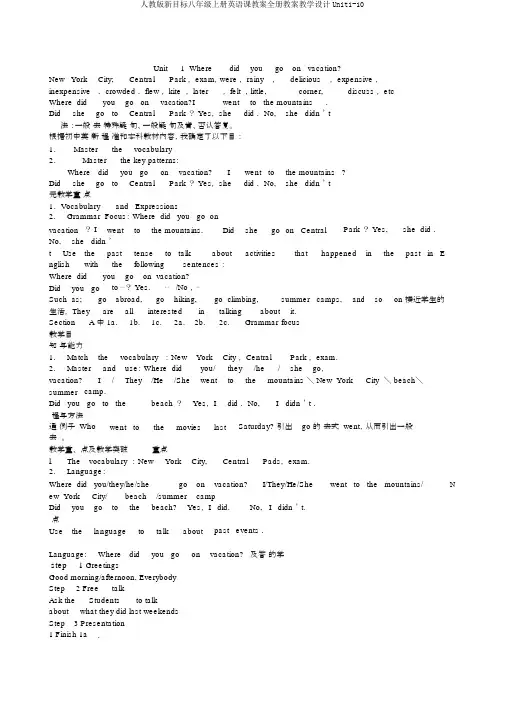
Unit 1 Where did you go on vacation?New York City;Central Park , exam,were , rainy,delicious, expensive ,inexpensive. crowded . flew , kite , later, felt ,little,corner,discuss , etcWhere did you go on vacation?I went to the mountains.Did she go to Central Park ? Yes, she did . No,she didn ’ t法:一般去特殊疑句、一般疑句及肯、否认答复。
根据初中英新程准和本科教材内容,我确定了以下目:1.Master the vocabulary2.Master the key patterns:Where did you go on vacation?I went to the mountains ?Did she go to Central Park ? Yes, she did . No,she didn ’ t元教学重点1. Vocabulary and Expressions2.Grammar Focus: Where did you go onvacation? I went to the mountains.Did she go on Central Park ? Yes,she did .No,she didn ’t Use the past tense to talk about activities that happened in the past in E nglish with the following sentences :Where did you go on vacation?Did you go to ⋯? Yes.⋯ /No ,⋯Such as;go abroad,go hiking,go climbing,summer camps,and so on 接近学生的生活, They are all interested in talking about it.Section A 中 1a.1b.1c.2a.2b.2c.Grammar focus教学目知与能力1.Match the vocabulary: New York City , Central Park , exam.2.Master and use: Where did you/they/he/she go,vacation?I/They/He/She went to the mountains \ New York City\ beach\summer camp.Did you go to the beach ?Yes, I did . No,I didn ’ t .程与方法通例子 Who went to the movies last Saturday? 引出 go 的去式 went,从而引出一般去。
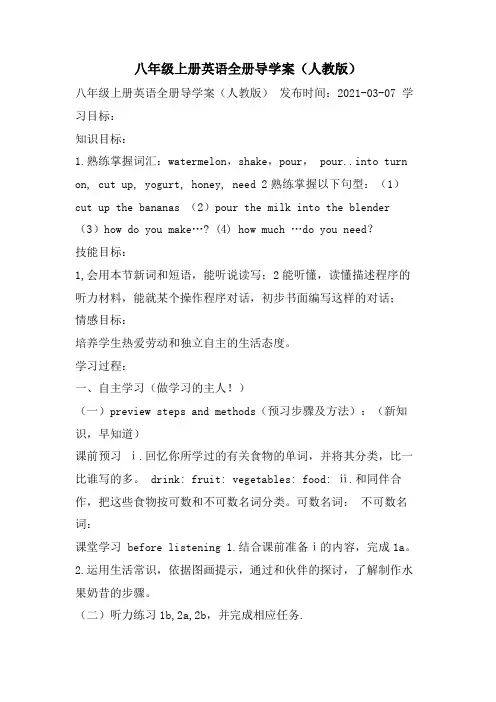
八年级上册英语全册导学案(人教版)八年级上册英语全册导学案(人教版)发布时间:2021-03-07 学习目标:知识目标:1.熟练掌握词汇:watermelon,shake,pour, pour..into turn on, cut up, yogurt, honey, need 2熟练掌握以下句型:(1)cut up the bananas (2)pour the milk into the blender (3)how do you make…? (4) how much …do you n eed?技能目标:1,会用本节新词和短语,能听说读写;2能听懂,读懂描述程序的听力材料,能就某个操作程序对话,初步书面编写这样的对话;情感目标:培养学生热爱劳动和独立自主的生活态度。
学习过程:一、自主学习(做学习的主人!)(一)preview steps and methods(预习步骤及方法):(新知识,早知道)课前预习ⅰ.回忆你所学过的有关食物的单词,并将其分类,比一比谁写的多。
drink: fruit: vegetables: food: ⅱ.和同伴合作,把这些食物按可数和不可数名词分类。
可数名词:不可数名词:课堂学习 before listening 1.结合课前准备ⅰ的内容,完成1a。
2.运用生活常识,依据图画提示,通过和伙伴的探讨,了解制作水果奶昔的步骤。
(二)听力练习1b,2a,2b,并完成相应任务.二、合作交流:co-operation.( 三个臭皮匠,顶个诸葛亮,two heads are better than one.) 小组练习对话1c,2c。
三、展示点拨:display (弘扬个性,展示讲解,让我们共同提供成功的喜悦!)role play the conversations in 1c and 2c. show to the classes.四、稳固提升:exercise in class (别低估了自己的潜力!)根据首字母提示补全单词,使句子完整通顺。
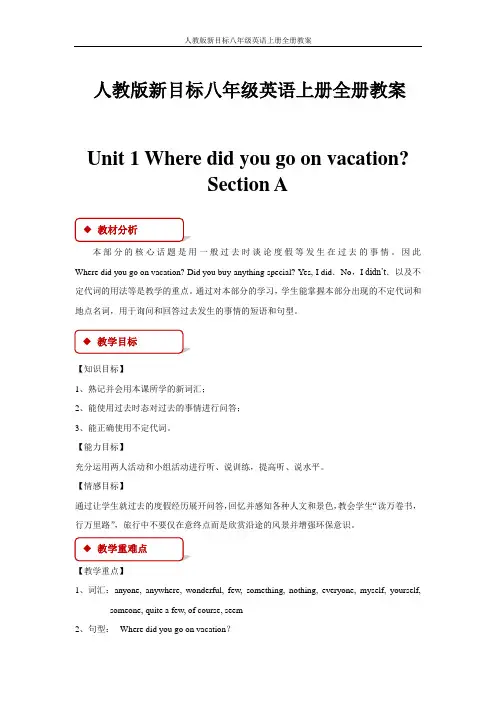
人教版新目标八年级英语上册全册教案Unit 1 Where did you go on vacation?Section A本部分的核心话题是用一般过去时谈论度假等发生在过去的事情。
因此Where did you go on vacation? Did you buy anything special? Yes, I did.No,I didn’t.以及不定代词的用法等是教学的重点。
通过对本部分的学习,学生能掌握本部分出现的不定代词和地点名词,用于询问和回答过去发生的事情的短语和句型。
【知识目标】1、熟记并会用本课所学的新词汇;2、能使用过去时态对过去的事情进行问答;3、能正确使用不定代词。
【能力目标】充分运用两人活动和小组活动进行听、说训练,提高听、说水平。
【情感目标】通过让学生就过去的度假经历展开问答,回忆并感知各种人文和景色,教会学生“读万卷书,行万里路”,旅行中不要仅在意终点而是欣赏沿途的风景并增强环保意识。
【教学重点】1、词汇:anyone, anywhere, wonderful, few, something, nothing, everyone, myself, yourself,someone, quite a few, of course, seem2、句型:--Where did you go on vacation?--I went to New York City.--Did you go out with anyone?--No. No one was here. Everyone was on vacation.--How was the food?--Everything tasted really delicious.【教学难点】掌握不定代词的用法,能使用过去时态谈论过去的事情。
Multimedia, PPTStep1. Warming upShow Ss some pictures. Then ask Ss what they did during summer vacation and where they went on vacation.Step2. Practice1. Change the verbs into past forms.2. Check the answers.3. Match the activities with the pictures in 1a.4. Check the answers.Step3. Listening1. Listen and number the people in the pictures in 1b.2. Check the answers.Step3. Pair workGet Ss to make conversations about the people in the picture. Then invite some pairs to show their conversations.Step4. Listening (2a &2b)1. Tell Ss they will hear a conversation about three Ss. Listen for the first time and fill in the chart. Then listen again and check “Yes” or “No”.2. Let Ss read the phrases in the chart of 2b.3. Play the recording the first time. Ss listen and fill in the chart.4. Play therecording a second time for the Ss to check “Yes, I did.” or “No, I didn’t.”5. Check the answers with the Ss.Step5. Pair work1. Let two Ss read the conversationbetween Grace, Kevin and Julie.2. Let Ss work in pairs and try to role-play the conversation.3. Ask some pairs to act out their conversations.4. Give Ss some pictures to do more oral practice.Step6. Role-play1. Ask Ss to read the conversation and answer the questions.2. Check the answers.3. Get Ss to role play the conversation after listening to the recording.4. Invite some pairs to act out their conversations in front of the class.5. Explain some language points.Step7. Survey1. Work in a group of four. One surveys others about your vacations and fill in the chart.2. Report their survey results.Step8. Language pointsExplain some language points.Step9. Grammar Focus1. Review the grammar box. Ask students to read the questions and answers.2. Review the difference between regular-ed past tense verbs and irregular past tense verbs.3. Then get the students to ask and answer the questions and answers in pairs.Step10. Language points & Exercises1. Explain the usages of indefinite pronouns and past tense.2. Do some exercises.3. Check the answers.Step11. Practice (3a&3b)1. Get Ss to finish 3a &3b.2. Check the answers.Step12. Group work1. Ask your group questions about their last vacation and fill in the chart in 3c. Then tell the class your results.2. Get several groups to show their results.Step13. SummarySummarize what we’ve learnt in this period.Step13. HomeworkFinish off the exercises of this period.略。
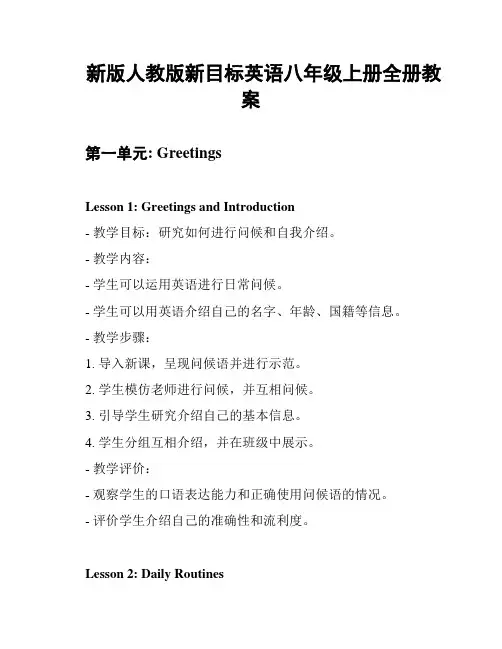
新版人教版新目标英语八年级上册全册教案第一单元: GreetingsLesson 1: Greetings and Introduction- 教学目标:研究如何进行问候和自我介绍。
- 教学内容:- 学生可以运用英语进行日常问候。
- 学生可以用英语介绍自己的名字、年龄、国籍等信息。
- 教学步骤:1. 导入新课,呈现问候语并进行示范。
2. 学生模仿老师进行问候,并互相问候。
3. 引导学生研究介绍自己的基本信息。
4. 学生分组互相介绍,并在班级中展示。
- 教学评价:- 观察学生的口语表达能力和正确使用问候语的情况。
- 评价学生介绍自己的准确性和流利度。
Lesson 2: Daily Routines- 教学目标:研究描述日常活动。
- 教学内容:- 学生能够运用英语描述自己的日常活动。
- 学生可以用英语叙述一天的活动安排。
- 教学步骤:1. 复前一课的内容,引导学生回忆日常活动的英语表达。
2. 引导学生研究新的日常活动的词汇和句型。
3. 学生分组分享自己的一天活动安排,并向全班汇报。
- 教学评价:- 观察学生对日常活动词汇和句型的掌握程度。
- 评价学生的口语表达和沟通能力。
第二单元: Hobbies and Leisure ActivitiesLesson 1: Hobbies- 教学目标:研究谈论自己的兴趣爱好。
- 教学内容:- 学生可以用英语描述自己的兴趣爱好。
- 学生可以运用所学词汇进行对话练。
- 教学步骤:1. 复前一课的词汇和句型。
2. 引导学生研究新的兴趣爱好词汇。
3. 学生分组进行对话练,谈论自己的兴趣爱好。
- 教学评价:- 观察学生对兴趣爱好词汇的掌握情况。
- 评价学生在对话练中的口语表达能力。
Lesson 2: Leisure Activities- 教学目标:研究谈论闲暇活动。
- 教学内容:- 学生能够用英语描述自己的闲暇活动。
- 学生能够与他人交流关于闲暇活动的话题。
- 教学步骤:1. 复前一课的词汇和句型。
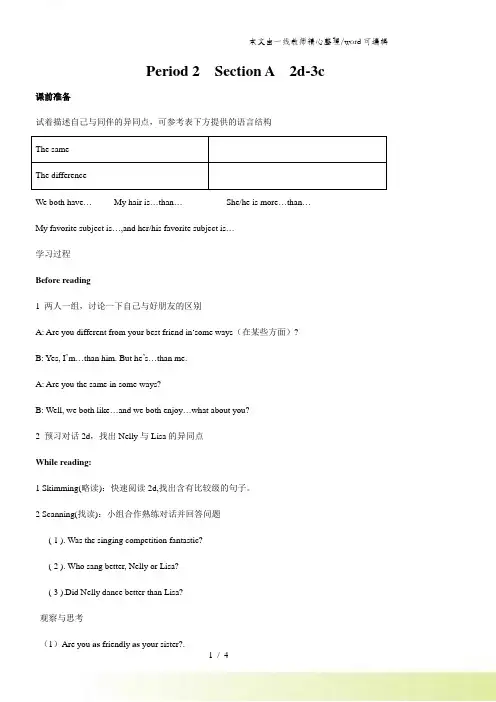
Period 2 Section A 2d-3c 课前准备试着描述自己与同伴的异同点,可参考表下方提供的语言结构The sameThe differenceWe both have…My hair is…than…She/he is more…than…My favorite subject is…,and her/his favorite subject is…学习过程Before reading1 两人一组,讨论一下自己与好朋友的区别A: Are you different from your best friend in some ways(在某些方面)?B: Yes, I’m…than him. But he’s…than me.A: Are you the same in some ways?B: Well, we both like…and we both enjoy…what about you?2 预习对话2d,找出Nelly与Lisa的异同点While reading:1 Skimming(略读):快速阅读2d,找出含有比较级的句子。
2 Scanning(找读):小组合作熟练对话并回答问题( 1 ). Was the singing competition fantastic?( 2 ). Who sang better, Nelly or Lisa?( 3 ).Did Nelly dance better than Lisa?观察与思考(1)Are you as friendly as your sister?.“as+形容词/副词的_____+as”表示“与……一样”,其否定形式为“not as/so…as”,表示前者不如后者,注意“so+形容词/副词的原级+as”只能用在_____句中。
( 2). She is a little more outgoing than me.a little 表示“稍微,有点”的意思,用来修饰形容词、副词或形容词、副词的_____。
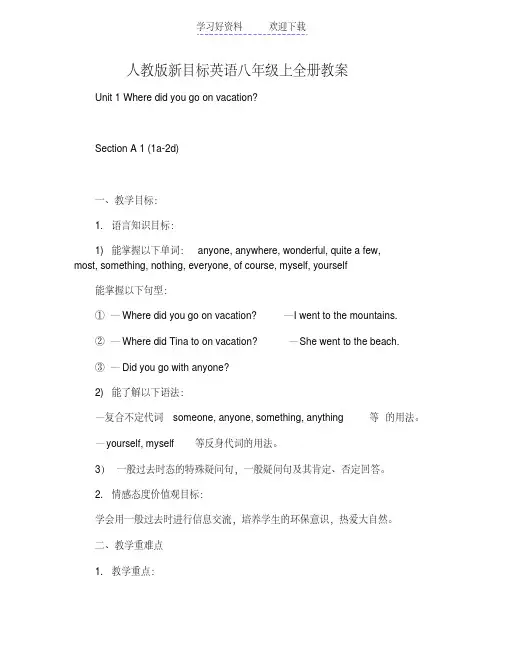
人教版新目标英语八年级上全册教案Unit 1 Where did you go on vacation?Section A 1 (1a-2d)一、教学目标:1. 语言知识目标:1) 能掌握以下单词:anyone, anywhere, wonderful, quite a few,most, something, nothing, everyone, of course, myself, yourself能掌握以下句型:①—Where did you go on vacation? —I went to the mountains.②—Where did Tina to on vacation? —She went to the beach.③—Did you go with anyone?2) 能了解以下语法:—复合不定代词someone, anyone, something, anything等的用法。
—yourself, myself等反身代词的用法。
3)一般过去时态的特殊疑问句,一般疑问句及其肯定、否定回答。
2. 情感态度价值观目标:学会用一般过去时进行信息交流,培养学生的环保意识,热爱大自然。
二、教学重难点1. 教学重点:1) 用所学的功能语言交流假期去了什么旅行。
2) 掌握本课时出现的新词汇。
2. 教学难点:1) 复合不定代词someone, anyone, something, anything等的用法。
2) yourself, myself等反身代词的用法。
三、教学过程Ⅰ. Lead-in1. 看动画片来进入本课时的主题谈论上周末做了些什么事情,谈论过去发生的事情。
Ⅱ. Presentation—Yes, I did./No, I didn’t. - 1 -1. Show some pictures on the big screen. Let Ss read the expressions.2. Focus attention on the picture. Ask: What can you see? Say:Each picture showssomething a person did in the past. Name each activity and ask students to repeat:Stayed at home, Went to mountains, went to New York City 6.Went to the beach,visited my uncle, visited museums, went to summer camp3. Now, please match each phrase with one of the pictures nextto the name of theactivity,point to the sample answer.4. Check the answers. Answers: 1. f 2. b 3. g 4. e5. c6. a7.dIII. Listening1. Point to the picture on the screen.Say: Look at the picture A. Where did Tina go on vacation? She went to mountains.Ask: What did the person do in each picture?2. Play the recording the first time.3. Play the recording a second time.Say: There are three conversations. The people talk about what did on vacation. Listen to the recording and write numbers of the names in the right boxes of the picture.4. Check the answers.IV.Pair work1. Point out the sample conversation. Ask two Ss to read the conversation to the class.2. Now work with a partner. Make your own conversation about the people in the picture.3. Ss work in pairs. As they talk, move around the classroom and give any help they need.4. Let some pairs act out their conversations.V. Listening1. Tell Ss they will hear a conversation about threestudents’ conversatio ns. Listen for the first time and fill inthe chart. Then listen again and check Yes, or No.2. Let Ss read the phrases in the chart of 2b.3. Play the recording the first time. Ss listen and fill inthe chart.4. Play the recording a second time for the Ss to check ―Yes,I did.‖ or ―No, I didn’t. ‖5. Check the answers with the Ss.VI. Pair work- 2 -1. Let two Ss read the conversation between Grace, Kevin andJulie.2. Let Ss work in pairs and try to role-play the conversation.3. Ask some pairs to act out their conversations.VII. Role-play1. First let Ss read the conversation and match the people andplaces they went.2. Let Ss act out the conversations in pairs.3. Some explanations in 2d.Homework:用英语询问你的一位好朋友,她(他)假期去了哪里?看到了什么?并将此对话写在作业上。
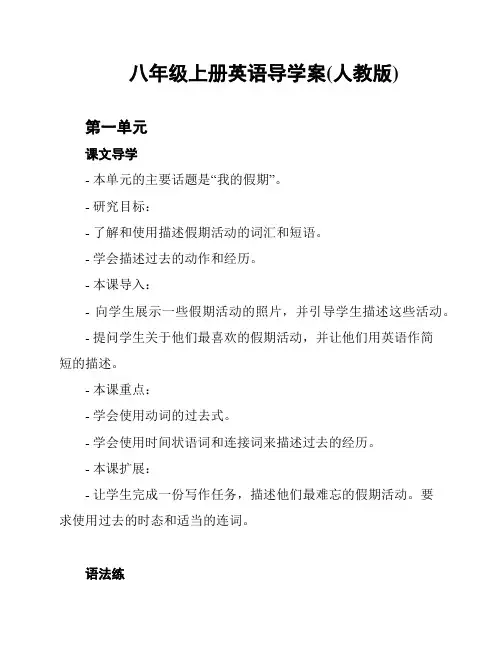
八年级上册英语导学案(人教版)第一单元课文导学- 本单元的主要话题是“我的假期”。
- 研究目标:- 了解和使用描述假期活动的词汇和短语。
- 学会描述过去的动作和经历。
- 本课导入:- 向学生展示一些假期活动的照片,并引导学生描述这些活动。
- 提问学生关于他们最喜欢的假期活动,并让他们用英语作简短的描述。
- 本课重点:- 学会使用动词的过去式。
- 学会使用时间状语词和连接词来描述过去的经历。
- 本课扩展:- 让学生完成一份写作任务,描述他们最难忘的假期活动。
要求使用过去的时态和适当的连词。
语法练1. 用所给动词的正确形式填空:- My family went (go) camping last summer.went (go) camping last summer.- We visited (visit) the Great Wall two years ago.visited (visit) the Great Wall two years ago.- Henry played (play) basketball with his friends yesterday.played (play) basketball with his friends yesterday.2. 将下列句子改为过去式:- I usually go swimming in the river. (went)- They often have picnics in the park. (had)- She sometimes watches movies at home. (watched)听力训练- 播放录音,让学生听对话并回答问题。
词汇练1. 根据句意和首字母提示,完成句子:- I like to go b_______ in the summer. It's very refreshing.- They v________ the Beijing Zoo last week and saw many animals.- She e________ a lot of delicious food on her trip to Italy.2. 选择正确的词填空:- We had a great time during our holiday. The weather was (beautiful / terrible).- Jack loves (swimming / swim) in the sea. He goes every weekend.- Lucy and Lily often (play / played) basketball together after school.第二单元(继续编写下一个单元的内容)第三单元(继续编写下一个单元的内容)第四单元(继续编写下一个单元的内容)(继续编写后续单元的内容)。
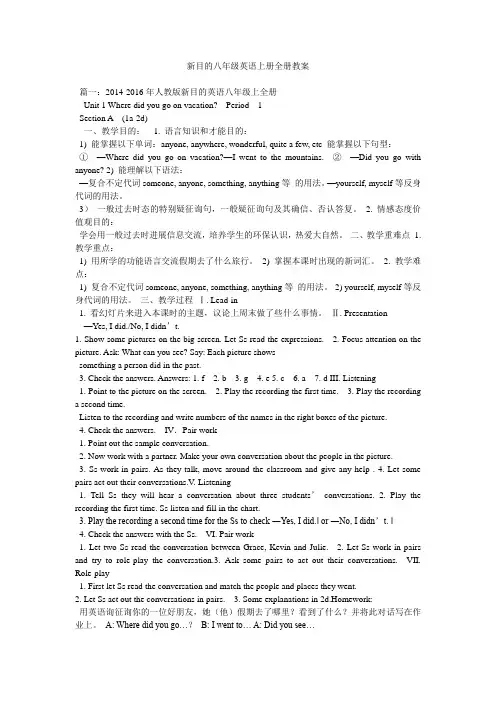
新目的八年级英语上册全册教案篇一:2014-2016年人教版新目的英语八年级上全册Unit 1 Where did you go on vacation? Period 1Section A (1a-2d)一、教学目的: 1. 语言知识和才能目的:1) 能掌握以下单词:anyone, anywhere, wonderful, quite a few, etc 能掌握以下句型:①—Where did you go on vacation?—I went to the mountains. ②—Did you go with anyone? 2) 能理解以下语法:—复合不定代词someone, anyone, something, anything等的用法。
—yourself, myself等反身代词的用法。
3)一般过去时态的特别疑征询句,一般疑征询句及其确信、否认答复。
2. 情感态度价值观目的:学会用一般过去时进展信息交流,培养学生的环保认识,热爱大自然。
二、教学重难点1. 教学重点:1) 用所学的功能语言交流假期去了什么旅行。
2) 掌握本课时出现的新词汇。
2. 教学难点:1) 复合不定代词someone, anyone, something, anything等的用法。
2) yourself, myself等反身代词的用法。
三、教学过程Ⅰ. Lead-in1. 看幻灯片来进入本课时的主题,议论上周末做了些什么事情。
Ⅱ. Presentation —Yes, I did./No, I didn’t.1. Show some pictures on the big screen. Let Ss read the expressions.2. Focus attention on the picture. Ask: What can you see? Say: Each picture showssomething a person did in the past.3. Check the answers. Answers: 1. f 2. b 3. g4. e5. c6. a7. d III. Listening1. Point to the picture on the screen.2. Play the recording the first time.3. Play the recordinga second time.Listen to the recording and write numbers of the names in the right boxes of the picture.4. Check the answers. IV.Pair work1. Point out the sample conversation.2. Now work with a partner. Make your own conversation about the people in the picture.3. Ss work in pairs. As they talk, move around the classroom and give any help .4. Let some pairs act out their conversations.V. Listening1. Tell Ss they will hear a conversation about three students’conversations.2. Play the recording the first time. Ss listen and fill in the chart.3. Play the recording a second time for the Ss to check ―Yes, I did.‖ or ―No, I didn’t. ‖4. Check the answers with the Ss. VI. Pair work1. Let two Ss read the conversation between Grace, Kevin and Julie.2. Let Ss work in pairs and try to role-play the conversation.3. Ask some pairs to act out their conversations. VII. Role-play1. First let Ss read the conversation and match the people and places they went.2. Let Ss act out the conversations in pairs.3. Some explanations in 2d.Homework:用英语询征询你的一位好朋友,她(他)假期去了哪里?看到了什么?并将此对话写在作业上。
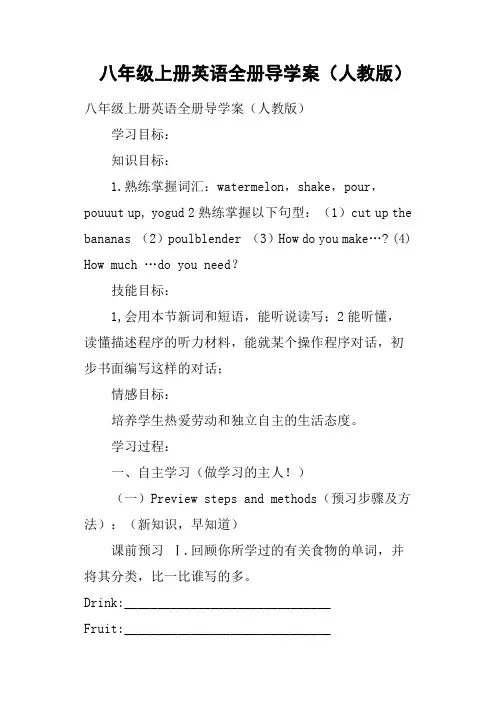
八年级上册英语全册导学案(人教版)八年级上册英语全册导学案(人教版)学习目标:知识目标:1.熟练掌握词汇:watermelon,shake,pour,pouuut up, yogud 2熟练掌握以下句型:(1)cut up the bananas (2)poulblender (3)How do you make…? (4) How much …do you need?技能目标:1,会用本节新词和短语,能听说读写;2能听懂,读懂描述程序的听力材料,能就某个操作程序对话,初步书面编写这样的对话;情感目标:培养学生热爱劳动和独立自主的生活态度。
学习过程:一、自主学习(做学习的主人!)(一)Preview steps and methods(预习步骤及方法):(新知识,早知道)课前预习Ⅰ.回顾你所学过的有关食物的单词,并将其分类,比一比谁写的多。
Drink:_______________________________Fruit:_______________________________Vegetables:__________________________Food:________________________________ Ⅱ.和同伴合作,把这些食物按可数和不可数名词分类。
可数名词:___________________________ 不可数名词:__________课堂学习 Before listening 1.结合课前准备Ⅰ的内容,完成1a。
2.运用生活常识,依据图画提示,通过和伙伴的探讨,了解制作水果奶昔的步骤。
(二)听力练习1b,2a,2b,并完成相应任务.二、合作交流:Co-operation.( 三个臭皮匠,顶个诸葛亮,Two heads are ban one.) 小组练习对话1c,2c。
三、展示点拨:Display (弘扬个性,展示讲解,让我们共同分享成功的喜悦!)Role plaversaand 2c. Showla四、巩固提升:Exlass (别低估了自己的潜力!)根据首字母提示补全单词,使句子完整通顺。
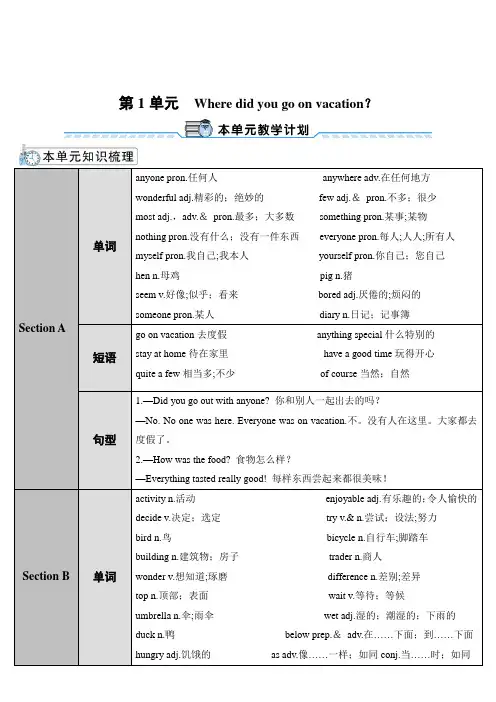
第1单元Where did you go on vacation?Section A 单词anyone pron.任何人anywhere adv.在任何地方wonderful adj.精彩的;绝妙的few adj.&pron.不多;很少most adj.,adv.&pron.最多;大多数something pron.某事;某物nothing pron.没有什么;没有一件东西everyone pron.每人;人人;所有人myself pron.我自己;我本人yourself pron.你自己;您自己hen n.母鸡pig n.猪seem v.好像;似乎;看来bored adj.厌倦的;烦闷的someone pron.某人diary n.日记;记事簿短语go on vacation去度假anything special什么特别的stay at home待在家里have a good time玩得开心quite a few相当多;不少of course当然;自然句型1.—Did you go out with anyone? 你和别人一起出去的吗?—No. No one was here. Everyone was on vacation.不。
没有人在这里。
大家都去度假了。
2.—How was the food? 食物怎么样?—Everything tasted really good! 每样东西尝起来都很美味!Section B 单词activity n.活动enjoyable adj.有乐趣的;令人愉快的decide v.决定;选定try v.& n.尝试;设法;努力bird n.鸟bicycle n.自行车;脚踏车building n.建筑物;房子trader n.商人wonder v.想知道;琢磨difference n.差别;差异top n.顶部;表面wait v.等待;等候umbrella n.伞;雨伞wet adj.湿的;潮湿的;下雨的duck n.鸭below prep.&adv.在……下面;到……下面hungry adj.饥饿的as adv.像……一样;如同conj.当……时;如同hill n.小山;山丘dislike v.&n.不喜爱(的事物);厌恶(的事物)enough adj.&adv.足够的(地);充足的(地);充分的(地)短语feel like给……的感觉;感受到because of因为arrive in到达 a lot of许多;大量的take some photos拍一些照片too many太多句型1.There are a lot of new buildings now, but many of the old buildings are still there. 现在那里有许多新的建筑物,但是许多老式的建筑物还在那里。

八年级上册英语全册导学案(人教版)学习目标:知识目标:熟练把握辞汇:atereln,shae,pur,purintturnn,utup,gurt,hne,need2熟练把握以下句型:(1)utupthebananas(2)purtheilinttheblender(3)Hduae…?Huh…duneed?技术目标:,会用本节新词和短语,能听说读写;2能听懂,读懂描述程序的听力材料,能就某个操作程序对话,初步书面编写如此的对话;情感目标:培育学生酷爱劳动和独立自主的生活态度。
学习进程:一、自主学习(做学习的主人!)(一)Previestepsandethds(预习步骤及方式):(新知识,早明白)前预习Ⅰ回忆你所学过的有关食物的单词,并将其分类,比一比谁写的多。
Drin:_______________________________Fruit:_______________________________Vegetables:__________________________Fd:_ _______________________________Ⅱ和同伴合作,把这些食物按可数和不可数名词分类。
可数名词:___________________________不可数名词:__________ 堂学习Befrelistening1结合前预备Ⅰ的内容,完成1a。
2运用生活常识,依据图画提示,通过和伙伴的探讨,了解制作水果奶昔的步骤。
(二)听力练习1b,2a,2b,并完成相应任务二、合作交流:-peratin小组练习对话1,2。
三、展现点拨:DisplaRleplathenversatinsin1and2Shtthelasses四、巩固提升:Exeriseinlass(别低估了自己的潜力!)依照首字母提示补全单词,使句子完整通顺。
L,sheisp________theaterinttheup,2SniaisthirstGiveherseatertd___________3theris_____________uptheeatintheithen4H_________ilduneed?eneedabananataetheils_____________6ushuldp__________ thefruitsbefreaingthefruitsalad单项选择:---_______gurtduant?---TupsAHanBHuhHlngDHften2---Han_________deneed?---Three AanappleBaappleapplesDapple3---Let’saethesalad!---___________AN,IantBThanuThat’sallrightDThatisagdidea4It’sdarintherPlease____________theright AturnnBturndnturnupDturnff---Thebananaistbig---uan____________fruit AutuptheButtheuputitupDutupit五、学(教)跋文:(学习也需要不断反思哦!)xx市第三初中八年级英语上册导学案班第小组姓名Unit8Hduaeabananailshae?SetinA主备:柴xx审阅:娄xx茹x时刻:XX12教师寄语:Reasntbuiltinada学习目标:知识目标:熟练把握以下辞汇:add,sugar,finall,beef,heese,pprn,add…t…,put…int,frgettd,han/uh2熟练把握以下句型(1)Hduae…?(2)Huh/an…deneed?技术目标:,会用本节新词和短语,能听说读写;2能听懂,读懂描述程序的听力材料,能就某个操作程序对话,初步书面编写如此的对话;情感态度:通过实践活动,培育学生的实际操作能力,调动学生的情感态度、爱好等非智力因素。
第5单元Do you want to watch a game show?Section A 单词news n.新闻节目;新闻mind v.介意;对(某事)烦恼educational adj.教育的;有教育意义的stand v.忍受;站立plan v.&n.打算;计划hope v.&n.希望discussion n.讨论;商量happen v.发生;出现expect v.预料;期待joke n.笑话;玩笑sitcom n.情景喜剧comedy n.喜剧;喜剧片短语think of 认为learn from 从……中获得find out 查明;弄清talk show 访谈节目soap opera 肥皂剧go on 发生hope to do希望做……plan to do计划做……look like 看起来像……expect to do期待做……around the world 全世界one day 有一天have a discussion about 就……讨论句型1.—What do you think of talk shows? 你认为脱口秀怎么样?—I don’t mind them./I can’t stand them!/I love watching them!我不介意它们。
/我无法忍受它们!/我喜欢看它们!2. Because I hope to find out what’s going on around the world. 因为我希望了解世界各处正在发生的事。
Section B 单词meaningless adj.毫无意义的;意思不明确的action n.行动cartoon n.动画片;卡通片culture n.文化;文明famous adj.著名的;出名的appear v.出现become v.开始变得;变成rich adj.富有的successful adj.获得成功的;有成就的might modal v.可能;可以main adj.主要的;最重要的reason n.原因;理由common adj.普通的;常见的film n.电影unlucky adj.不幸的;不吉利的lose v.失去;丢失ready adj.愿意的;准备好的simple adj.简单的;易做的army n.陆军;陆军部队girlfriend n.女朋友character n.人物;角色character n.人物;角色短语be ready to 愿意(做某事)dress up 装扮;乔装打扮as famous as与……一样有名let sb.do sth. 让某人做某事such as例如 a pair of一双;一对come out出版;发行try one’s best to do sth. 尽力做某事句型1. In his early films, Mickey was unlucky and had many problems such as losing his house or girlfriend, Minnie. 在他的早期影片里,米老鼠是不幸的,他面临许多问题,比如失去自己的房子和女朋友米妮。
人教版八年级英语上册导学案全册 Unit1Where did you go on vacation Section A集中识词 【学习目标】:1,掌握重点单词的用法 2,掌握重点句型:Where did you go on vacation? Did you go anywhere interesting? 【学习重点】:一般过去时的复习 【课前预习】:看P7,8,完成下列单词: (一个两遍) 1. 任何人______________________2. 任何地方____________________3.精彩的__________________ 4.很少____________________ 5.大多数_____________________6. 某物;某事__________________ 7.没有什么____________________8.每人___________________9.我自己__________________________ 10. 你自己____________________11. 母鸡_________________12.猪_____________________________ 13.好像______________________14.厌烦的___________________15.某人_________________________ 16.日记______________________ 二.完成下列短语:(一个一遍) 1. 相当多____________________2. 去度假___________________3.为考试而学习__________________ 4.照相____________________5.购物_____________________6.记日记__________________________ 7.当然__________________8.夏令营_________________9.出去___________________________ 10.第一次______________________11.在农村_________________________ 【合作探究】请预习1单元 Section A 的内容,掌握并完成下列知识。 一. anyone 意为____________. 是指人不定代词。某人________, 每个人_________, 没有人__________. 当形容词修饰不定代词时,要后置。 Eg: 1. Is there ________at home? 有人在家吗? 2. Is there _________ _________ in school today? 今天学校有重要的人吗? 【扩展】:不定代词还有指物不定代词:某件事(东西)___________, 任何事(东西)_________, 所有事(东西)_____________,没有事(东西)______________. 还有一些副词:任何地方_________, 某个地方____________, 每个地方____________,无处__________. 归类:当形容词修饰这些不定代词和副词时, 要______________. Eg: 1. You can go ________ _________, if you like. 如果你喜欢,你可以去任何有趣的地方。 2. I want to tell you _________ ________ about my vacation.我想告诉你有关我假期的一些特殊的事情。 二. few 意为__________, 修饰___________名词, 倾向于否定。 固定搭配:_____________.修饰_________________名词. 倾向于肯定。 little 意为_____________,修饰___________名词, 倾向于否定。 固定搭配:_____________.修饰_________________名词. 倾向于肯定。 quite a few 表示相当多, 修饰___________名词。quite a little表示相当多,修饰__________名词. Eg: 1. Tom is happy because he has _______ _______ friends here. 汤姆很开心因为他在这有一些朋友。 2. ______people like talking with the bad boy. 很少人愿意和那个坏孩子说话。 3. There is _______ ______milk left in the bottle. 瓶子里还剩一点牛奶。 2
4. There is _______ food in the fridge and you should buy some. 冰箱里几乎没食物了,你应该买一些。 5. There are ______ _____ ______people at the us stop waiting for the bus.公共汽车站有很多人在等车。 6. There’s still _______ ___ ______ milk in the cup. 杯子里仍然有不少牛奶。 三.most adj. _________. most 修饰名词,most of+名词,意为:大部分„,作主语时谓语动词的单复数取决于名词的单复数。 Eg: 1. _______ ________ are studying English hard now. 现在大多数学生都在努力学习英语。 2. I think most of the food ________ (be) delicious. 四.myself 意为:___________. 是反身代词,在句中作同位语或宾语。其它反身代词,我自己:_______,你自己:_______, 他自己_________,她自己________,它自己________,我们自己________,你们自己___________他们自己___________. 固定短语:teach myself 我自学 enjoy oneself 过得愉快 by myself 我亲自„ 【跟踪训练】 I. 单项选择。 ( )1. ---Kate, I’m going on business. Please look after _______well. ---Don’t worry, Mom. I will. A. herself B. myself C. yourself D. himself ( )2. I’d like to go _____________ on vacation. A. nowhere interesting B. interesting anywhere C. somewhere interesting D. interesting somewhere ( )3. ----How was your weekend? ----Very good! I ______the ScienceMuseum with my classmates. A. visit B. visited C. am visiting D. will visit ( )4. She is new here, so we know ______ about her. A. nothing B. something C. anything D. everything ( )5. I can’t find my watch, but it must be ______in this room. A. everywhere B. nowhere C. anywhere D. somewhere ( )6. Everyone ______I come form Sichuan. Actually(事实上), I come from Shandong. A. find B. think C. finds D. thinks ( )7. ---Did you have a good weekend? ---______. We enjoyed ourselves in the park. A. I’m afraid not B. I don’t think so C. Of course D. I hope not ( )8. ----Where is my notebook? ---I don’t know. It isn’t here. Maybe _____took it away by mistake.(错误) A. everybody B. nobody C. anybody D. somebody ( )9. ----How was your trip? ----______. I hope I can go there again. A. Just so-so B. Not very good C. Nothing special D. Wonderful ( )10. He is a famous(著名的) cook. This dish tastes ______. A. very well B. good C. well D. bad II. 用词的正确形式填空。 1. More and more __________(visit) come to visit China these years. 2. I’m going to go _______(shop) for clothes at the Fashion Parade Store today. 3. The farmer keeps 50 p_______ on the farm every year. 4. It was raining hard. But I left my u__________ at school. 5. Health depends on good food and e_________sleep.
III. 用方框中词的适当形式填空。feed, anything, of course, buy, work 6. Do you have___________ important to say? 7. My father _________me an interesting storybook yesterday.